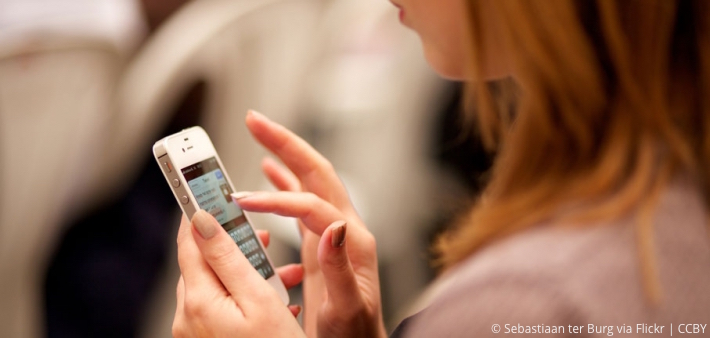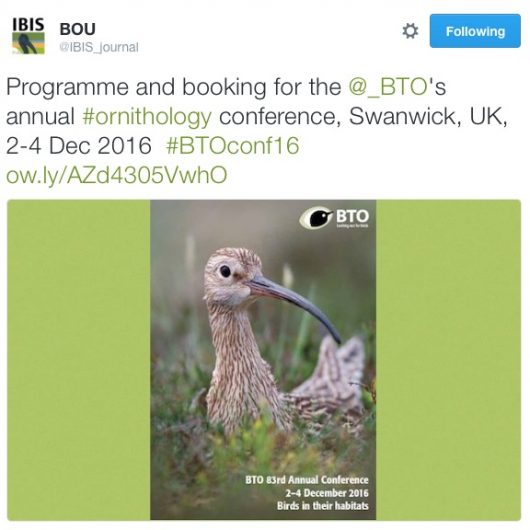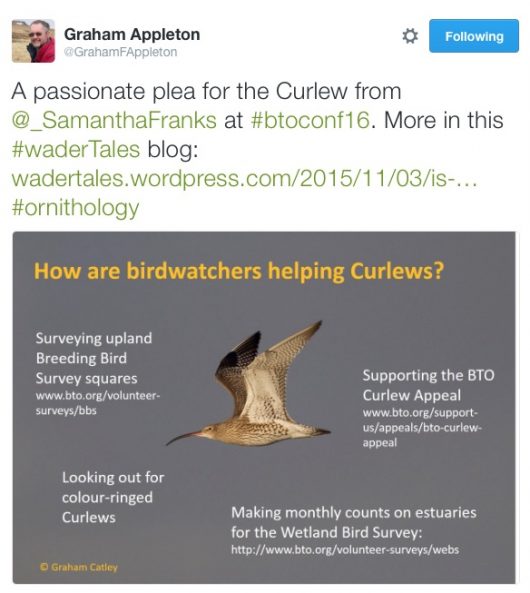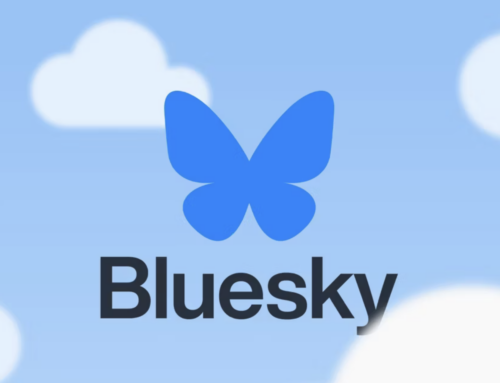
BOU
As the autumn conference season comes to a close I’m in a reflective mood about how I saw conference delegates, presenters and hosts using social media, in particular Twitter, around recent events. And it found me asking, what is conference tweeting really about?
As a conference host (for the BOU), social media conference coverage is about providing a summary of the science being presented, collating comments and responses from those present, and providing a flavour of the social side of an event. This is aimed partly for the conference audience, but just as much it is also aimed at the audience external to the event itself – an audience often larger and broader than those at the event. But are the BOU and others making the most of this coverage?
I don’t think many of us are. If we leave delegates to one side, as their tweets and posts are outside presenters and organisers sphere of influence, I think many of us have room for improvement.
An @IBIS_journal conference promotion tweet tagging the @host, #conference tag, wider #ornithology tag, image and link. Perfect!
Presenters – your work can reach a larger audience
Preparing a conference talk or poster involves hours of work, so why limit the coverage of your presentation to the limited number of people at the event itself?
OK, not all presentations are ‘Twitter OK’, but if they are, there is potentially a much larger online audience that you could extend your presentation to with just a little additional planning.
I don’t often present, but when I do I schedule tweets to be sent during my presentation (talks and posters). My tweets summarise my presentation (not someone else’s interpretation of it) and allow me to link to online content (papers, blogs, other tweets) and with the tags relevant to the conference and wider online audience (and hopefully reaching new researchers). For oral presentations I plan one tweet every two minutes, and for a poster presentation its around one every ten minutes for the duration of the session – or however many tweets it takes to get the key points across.
One of my own tweets promoting my own EOU2015 talk ahead of presenting it which includes topic tags, the two session hosts (BOU and RSPB Science), our own #session tag, the #conference tag and a link to online content. See the #EOUsocialmedia tag on Twitter (12 Aug) for the BOU’s scheduled tweets which coincided with me delivering the presentation.
So, presenters, do –
- Plan social media tweets and posts in advance.
- Schedule some ahead of your presentation slot.
- Schedule them to go live whilst you are presenting.
- Schedule some after your presentation slot.
- Link tweets to online content promoting your project or recent paper(s).
- Add an image for impact – you can now add up to four images per tweet without using up any of your characters.
See also
Scheduling tweets with Tweetdeck
Scheduling tweets with Hootsuite
Conference tweeting and #Twitterqette
Conference hosts – promoting speakers and their science
As conference hosts we can also all do more for our presenters. Conference hosts are often very good at providing additional coverage of their own institute’s research as they have ready knowledge and access to online content linking to it.
This could be extended to other presenters by collecting key messages and images from them before the event and having the content ready to go during their respective presentations.
The BOU have attempted to do this in recent years with little success, but we’ll be more proactive in the future as all our conference presentations are from third-party presenters, so it’s down to us to develop this within our own events as a benefit to speakers.
So, hosts, do –
- Collect key points of each presentation from presenters
- Collect links to presenters’ online content promoting their project or recent paper(s).
- Have abstracts of conference presentations online to link to.
- Collect/prepare images for each speakers’ presentation.
See also
Conference tweeting and #Twitterqette
The BTO did one of the best job’s I’ve seen of a host in some time. This conference tweet is near-perfect. It uses their own #conference tag, their own #research tag, a link to online content and several very good images. At 140 characters it is only lack of space that prevents using additional tags, e.g. #ornithology, and even not enough room to add just # to Cuckoos (which BTO use for their own cuckoo research).
Beyond the conference hashtag
It’s not all about the conference. Most conferences attract a relatively small level of followers and engagement around the event itself. The conference hashtag is great for collating all the tweets and posts relating to a single event in real time which can also provide a very good resource that can be accessed/used later (I frequently look back over events I have missed and find things to share with @IBIS_journal followers). But cross-posting using other hashtags relevant to the conference or individual presentations not only increases audience, but also advertises an event outside of the event itself.
There are lots of other hashtags being used, but some of the most regular seen for our audience are #ornithology (obviously – see here), #shorebirds, #seabirds, #seabirdersaturday, #urbanbirds and #urbanecology. The tag #raptors has a lot of non-science on it and unless you want to cross over to a really general tag, avoid #birds as there is rarely any science content on this one and it is used by Uncle Tom Cobbly et al when posting images of birds.
A great example of the perfect conference delegate tweet tagging the @speaker, #conference tag, their own #blog tag, a link to their blog, the widely used #ornithology tag and an infographic. Only the addition of the #shorebird tag could have improved this tweet, but there weren’t any characters left!
More social media blogs and content from the BOU
How social are ornithologists? – an IBIS Viewpoint article
How social are ornithologists? – our NAOC2016 poster
How social is #NAOC2016? – a blog from NAOC2016
Let the BOU work for YOU . . altmetrics
Let the BOU work for YOU . . blogging
Let the BOU work for YOU . . on social media
The benefits of blogging about your research
What is Altmetric?
Making social media and the web work for you
Social media is relevant to your research
Presentations from the BOU’s ‘social media in ornithology’ workshop at #EOU2015
What do you mean you ‘don’t know how to optimize your paper for SEO?!
Twitter – building an online ornithological community
The global ornithological online community
Ornithological Twitterati, Tweetie-pies and #birdieluv
Twitter #masterclass 1 – #hashtags and retweets
Twitter #masterclass 2 – stop using auto-generated tweets
Twitter #masterclass 3 – editing and structuring your tweets
Twitter #masterclass 4 – organise your incoming tweets
Twitter #masterclass 5 – content is everything
Twitter #masterclass 6 – #hashtag best practice
Twitter #masterclass 7 – using images – best practice
Twitter #masterclass 8 – conference tweeting (for delegates, presenters and organisers)
Twitter #masterclass 9 – Twitter basics 1: terminology
Twitter #masterclass 10 – Twitter basics 2: replying to tweets
Twitter #masterclass 11 – Twitter basics 3: replying to tweets
Twitter #masterclass 12 – Twitter best practices
About the author
Steve Dudley, the BOU’s Senior Administrator of 19 years, is responsible for social media and communications.
More social media articles by Steve
Blog posts express the views of the individual author(s) and not those of the BOU.
Blog with #theBOUblog
If you want to write about your research in #theBOUblog, then please see here.

